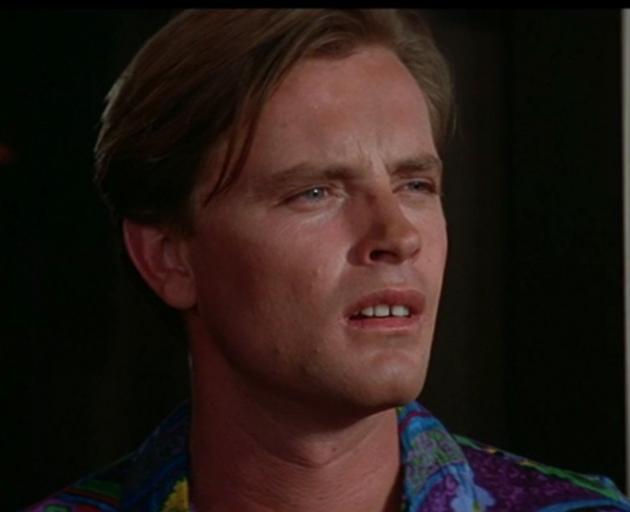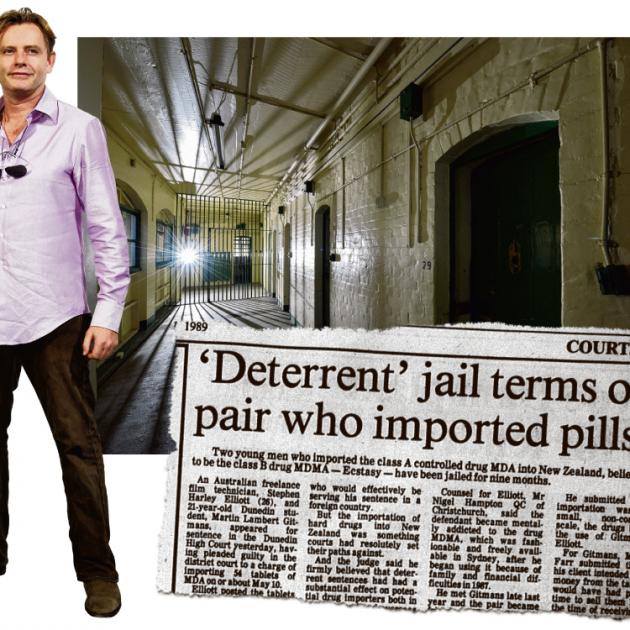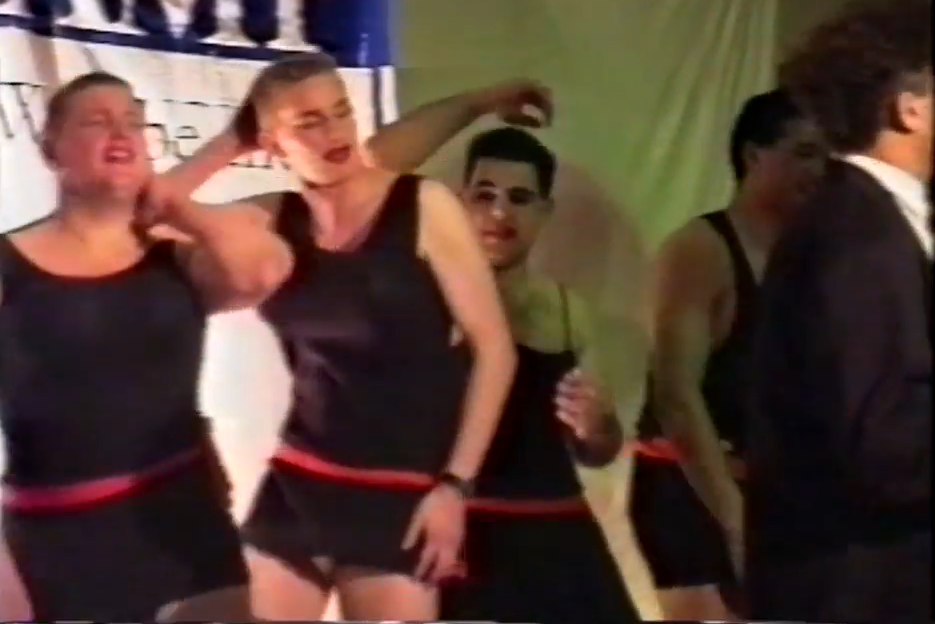
Priscilla, Queen of the Desert, the celebrated Aussie drag-queen story we all thought we knew, turns out to have fabulous New Zealand roots.
Bruce Munro uncovers Priscilla’s untold origin story of drugs, prison and lip-syncing, all set in little old Dunedin.
Outside, the clouds threaten rain. But that is irrelevant to the young man standing in the dock in the High Court, in Dunedin, New Zealand.
It is a Friday, in late-winter of 1989. Tonight, DJ Mike T, of London, will be pulling a crowd at Sammy's Night Club, on Dunedin's Crawford St.
But the 26-year-old Australian awaiting his prison sentence will have to miss the fun.
Up the road from the historic Stuart St High Court, Dead Poet's Society starring Robin Williams, and Stephen King's Pet Semetary, head the billing at the city's movie theatres.
But if he hasn't seen them already, the films will be long gone by the time this freelance film technician gets another chance to go to the movies.
Because, when High Court judge Alan Holland delivers his judgement, the young white male learns he is going away for nine months.
It will not be the last that is heard of him.
The Adventures of Priscilla, Queen of the Desert hit the big screen in 1994.
The tale of two drag queens and a transsexual, who take a road trip to the Australian Outback to perform a lip-sync cabaret show, became an international, cult hit. The film won an Oscar for costume design and broke new ground for the gay and transgender communities.
According to an often-repeated, widely endorsed history, Priscilla was first dreamt up by film-makers Stephan Elliott and Andrena Finlay while they were working on another film, Frauds.
They pitched the Priscilla idea at the Cannes Film Festival, in 1991, but without success. Help from the Australian Film Finance Corporation got the movie off the ground two years later.

Flamboyant costumes, an entertaining story, a feel-good soundtrack and likeable characters - Terence Stamp as Bernadette Bassenger, Hugo Weaving as Tick/Mitzi, and Guy Pearce as Adam/Felicia - earned the low-budget movie almost $30 million at the box office. It is also credited with bringing LGBT characters and issues to mainstream audiences.
A decade later, the Priscilla phenomenon grew again when Elliott and Allan Scott adapted the story for stage. Priscilla, The Musical, boasting more than 500 glitzy costumes, has been staged in at least 21 countries, including a Bette Midler-produced season on Broadway and a two-year run in the West End. The award-winning show visited New Zealand in its early days and is back again, 20 years later, including an 11-night run in Dunedin, beginning Thursday.
This much is known, accepted.
But then, in January, a caller, who does not want to be identified, claims Elliott spent time in Dunedin; that he, in fact, worked on the script of Priscilla while in prison in the Edinburgh of the South.
Could it be true that the international film and stage sensation described unforgettably as a story about "a cock, in a frock, on a rock'' was actually written by a crim, in the bin, in Dun-e-din? Did Elliott's big break come from time spent in Dunedin prison?
A quick search through the global mountain of literature that has been, and is still being, written on Priscilla reveals no whisper of Dunedin nor prison.
But the facts bear out the little known backstory, and these surprising revelations give fresh and important insights to the story and its inspiration. The history of the making of Priscilla has to be rewritten. Here it is.
NOBODY close to the events of three decades ago is willing to put their names to the information and comments they provide.
Elliott himself does not respond despite approaches through closely linked third parties, such as London-based Nullabor Productions, which oversees and manages all international versions of Priscilla.
The public record states that Elliott was born in Sydney, Australia, in August, 1964.
In his late teens, he and a friend performed weekly at Sydney's Cremorne Orpheum theatre, dressed as the Blues Brothers.
Readily available information then tends to jump to a skiing accident in 2004, it adds that he had a civil partnership ceremony with his long-term partner Wil Bevolley in 2008 and states that he came out as gay in 2012.
But court reports do not lie. What they show is that in 1989 and 1990, Elliott was in Dunedin, in jail.
On Friday, October 6, 1989, in the Dunedin High Court, Justice Holland sentenced Stephan Harley Elliott and Martin Gitmans (21) to nine months in prison on charges of importing a Class A drug.
The word from people who met and knew Elliott in Dunedin is that he visited more than once to spend time with a Dunedin-based boyfriend.
One person described Elliott as "big, loud and confident''.
Another said he and the boyfriend were "nice enough fellows'' and "young, good-time kids''.
At first glance, Dunedin in the late-1980s might seem a strange place for a brash, young, gay, Sydney-ite to visit. It's about 10degC cooler and, in 1990, was about a 30th of the size.
But dig a little deeper and it is surprising what you find.
New Zealand legalised homosexuality between consenting adults in 1986, eight years before the same law was introduced countrywide in Australia. It made this country an attractive holiday destination for gay Aussies.
It was a time when people still congregated to drink, dance and socialise. And Dunedin, with its annual influx of university students from throughout the country, had an active night life.

"We went to a lot of parties,'' said someone who knew Elliott well.
A full report in the newspaper the day after the sentencing, detailed how the pair fell foul of the law and got caught.
"`Deterrent' jail terms on pair who imported pills'' declares the headline.
The article states that Elliott and Gitmans pleaded guilty to a charge of importing 54 tablets of the Class A drug MDA, believing it was the Class B drug MDMA, or Ecstasy.
On about May 10, Elliott, in Australia, posted the pills to Gitmans, a student in Dunedin, and had then travelled here himself.
When police arrested the pair in Dunedin about three weeks later, there were only 23 tablets left.
Defending Elliott was lawyer Nigel Hampton who just that year had been appointed a Queens Counsel. Now one of this country's few internationally recognised criminal lawyers, Hampton said during his defence that Elliott had become addicted to MDMA, "which was fashionable and freely available in Sydney''. He had started using it because of "family and financial difficulties in 1987'', the lawyer said.
The judge accepted Elliott and Gitmans' assertions they believed the pills were Ecstasy, that they were for personal use and that they were not drug dealers.
Justice Holland said the pair "obviously had great futures ahead of them'' and that prison would "probably do neither of them any good'', adding that it would be particularly difficult for Elliott "who would effectively be serving his sentence in a foreign country''.
It was a "tragic day'' for the two men and their parents. But a deterrent sentence had to be imposed to stop others importing drugs, he said.
A small group of friends and acquaintances attended the trial.
Recalling the events, one said the men were upset when they realised they were going to jail.
"I think it was a huge shock to them. Because they were middle-class kids just obtaining [drugs] for themselves.''
Another, however, said they were "very lucky'' to only get nine months. If the judge had not accepted their account of mistakenly buying stronger drugs, the maximum jail term for Class A drugs was life imprisonment.
If Elliott had been sitting in a cell for 15 years, Priscilla might never have been made.
Instead, an acquaintance says the budding film-maker used his time inside to work on the film script.
Looked at in that light, the fingerprints of Elliott's sojourn in Dunedin, and in prison, are all over Priscilla.
With Ecstasy playing a leading role in the predicament Elliott found himself in, it is no surprise the party pill made its way into the script. Five minutes into the film, Adam is singing about their planned trip to Alice Springs.
"Our desert holiday; let's pack the drag away. You take the lunch and tea; I'll take the Ecstasy,'' he croons.
Life in prison was no holiday. But that may have actually helped Priscilla become such a fabulous flight of fancy.

The old Dunedin gaol, which sits directly behind the High Court in downtown Dunedin, is a late-Victorian, three-storey penitentiary in orange brick and grey slate.
In 1989, it housed up to 80 prisoners in single- and double-bunk cells that were little different from when the prison opened almost a century earlier.
Each cell was "furnished'' with a metal-framed bed; a small, ineffectual electric tube heater; a chair and a piece of metal screwed to the wall to serve as a shelf or, in the unusual case of a scribbler in the slammer, a writing desk.
Toilets were not installed until the new millennium. Elliott would have had to use a bucket that was emptied each morning.
The prison was Dickensian and the life regimented. Guards controlled the lights, which came on at 6am and went out at 10pm after the cells had been locked.
It would have been a shock to someone used to enjoying a full and free nightlife.
In Priscilla, the three actors mouth along to the Patti Page number I don't care if the sun don't shine as their bus lumbers through the Outback. The breezy, sexy tune could easily have come wistfully to Elliot's mind while lying in the dark on his cell bed at the time of night he would normally just be getting going.
"Well, I don't care if the sun don't shine,'' Page belts out.
"I get my lovin' in the evening time,
"When I'm with my baby.
"Well, it ain't no fun with the sun around.
"I get going when the sun goes down,
"And I'm with my baby.''
Months of confinement in a foreign land would have fanned the flames of desire for home and freedom; emotions evoked so strongly in a film about a reckless roadtrip into the heart of the Lucky Country.
Elliott's drab surroundings and monotonous existence may well have spurred him to greater heights of fantasy. Felicia standing atop a moving bus dressed in a fitting silver gown, silver head piece and makeup, trailing many metres of silver train like a gorgeous, giant, winged alien, all the while bellowing stanzas from La Traviata ... It seems like a vision conceived in direct reaction to deariness and deprivation.

AND then there is the lip-syncing.
The progenitor of details about Priscilla's origin story said he believed Elliott and his boyfriend took part in a lip-sync competition in Dunedin; a lip-sync competition at Sammy's Night Club, in which they sang Bananarama songs, dressed in drag.
The parallels to Priscilla, a story that is all about lip-syncing drag queens, are obvious.
Although someone closer to the two men does not recall the lip-syncing, she says that does not mean it did not happen.
Lip-sync competitions were certainly a happening thing in Dunedin three decades ago.
Sam Chin, the former owner of the eponymous night spot, remembers running regular lip-sync events for several years during the 1980s.
There were lots of amateur drag acts, he says. The one he most vividly recalls is Brent Lucas - who these days is the owner of a building firm with more than a dozen employees, but then was an Otago Colts rugby player - winning a lip-sync final impersonating Dolly Parton.
Some competitions were open to anyone. It is one of these that Elliott and his boyfriend likely entered, dressed up as members of the 1980s British female pop group, performing their hit tunes Shy Boy and Cruel Summer.
But the bastion of lip-sync in Dunedin was the rugby clubs.
Competitions were staged within and between clubs. For Kaikorai Rugby Club, it was the biggest fundraiser of the year.
Michael Shanks, who helped organise the events for Kaikorai, says semifinals and finals were held at Regine's and Sammy's in front of 600-strong audiences.
"You couldn't move. It was packed,'' Mr Shanks says.
Another person involved says, "It was huge. They were crazy times and there were a lot of laughs''.
The thought that Dunedin rugby heads, often seen as the archetype of the macho Southern Man, played an inspirational role in a film that helped mainstream gay issues, is a sublime irony.

Doug Kamo is co-producer and co-choreographer of Priscilla, The Musical, which is about to to start its Dunedin run. He is fizzing about the link between the show and the city.
"That's incredible,'' Kamo says.
"To think that 30 years ago, here was a gentleman who ended up in Dunedin in very trying times, and he used that time to pen the movie that really introduced the LGBT community to a mainstream audience and went on to become a cult movie.
"And then, 10 years later, he writes the musical that has been performed around the world with great success.
"It's very exciting to think there is such a connection with Dunedin.
"It's really very, very special.''
The person who knew Elliott well in Dunedin, says they are not sure how much of the film he wrote while in prison.
He did work on the script while locked up. But they guess he was reworking drafts rather than writing the whole thing from scratch.
"Only Stephan could say how much he wrote here,'' they say.
It is Saturday, October 7, 1989, the first day of Elliott's incarceration in Dunedin. Does he work on the film script of Priscilla? It is a rainy day, a good day for writing, so maybe he does. And the drizzle and the privation and the prison walls are not all entirely irrelevant. They are a counterweight, a spring board for the imagination. His mind's eye fills with colour and sunshine and song, he picks up his pen, his future is fabulous.

STEPHAN ELLIOTT
The filmography. —
• Frauds (1993)
• The Adventures of Priscilla, Queen of the Desert (1994)
• Welcome to Woop Woop (1997)
• Eye of the Beholder (1999)
• Easy Virtue (2008)
• A Few Best Men (2011)
• Rio, I Love You (2014)
• Swinging Safari (2017)

Penned in the Pen
Ten famous pieces of literature written in prison
Our Lady of Flowers, by Jean Genet
In 1943, while in prison for theft, French playwright Genet wrote this largely autobiographical novel about a drag queen in the Paris underworld.
Conversations with Myself, by Nelson Mandela
A memoir by South Africa’s leading apartheid opponent who spent 27 years in prison before becoming South Africa’s first post-apartheid president.
Le Morte d’Arthur, by Sir Thomas Malory
Imprisoned during the 1450s, Malory used the years he spent waiting for trial recounting the legendary heroics of King Arthur and his knights.
Letters from Birmingham Jail, by Martin Luther King Jun
The Unites States civil rights activist penned this defence of non-violent protest in 1963 while in prison for organising a peaceful demonstration against racial segregation.
De Profundis, by Oscar Wilde
In the late-1900s, Wilde, a witty and flamboyant Irish writer and poet, wrote this defence of his way of life during two years in Reading jail for homosexuality.
Don Quixote, by Miguel de Cervantes
Sometimes considered the first modern novel, this humorous tale of a nobleman’s delusional adventures was written by the 16th-century Spanish writer during a stint in prison for mismanagement as a tax collector.
Pilgrim’s Progress, by John Bunyan
This allegorical tale of the Christian life was written by Bunyan in 1678 during 12 years in Bedford jail for refusing to stop his public preaching.
Justine, by the Marquis de Sade
The first draft of this novel about sexual exploits with an emphasis on violence was written by the 18th-century French nobleman while in prison in the Bastille.
The Travels of Marco Polo, by Rustichello da Pisa
This seminal 13th-century travelogue of Central Asia and China was written by da Pisa chronicling the travels of his fellow inmate Polo after both were taken prisoner by Venice’s enemy Genoa.
History of the World Volume 1, by Sir Walter Raleigh
Intended to be the first of a five-part history, Sir Walter wrote this while locked up in the Tower of London for conspiring against King James I, but was executed in 1618 before writing the sequels.












